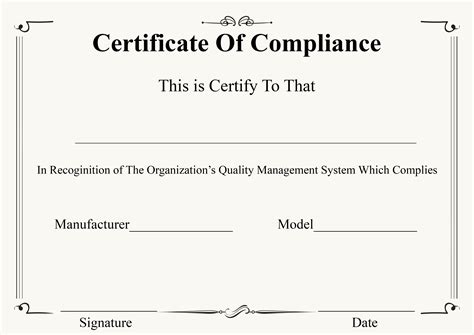Code compliance is a crucial aspect of building construction, ensuring that structures meet safety and regulatory standards. However, the process of obtaining a Code Compliance Certificate (CCC) can be daunting for many property owners and builders. In this article, we will break down the CCC application process, highlighting the key steps and requirements to make it easier for you to navigate.
What is a Code Compliance Certificate?
A Code Compliance Certificate is a document issued by a local authority or building regulatory body, confirming that a building or structure complies with the relevant building codes and standards. The certificate is usually required before a building can be occupied or used for its intended purpose.
Why is a Code Compliance Certificate Important?
A Code Compliance Certificate is essential for several reasons:
- It ensures that the building is safe for occupancy and use.
- It verifies that the building meets the relevant building codes and standards.
- It provides proof of compliance with regulatory requirements.
- It can affect the value and insurability of the property.
The Code Compliance Certificate Application Process
The CCC application process typically involves the following steps:
- Pre-Application: Before submitting a CCC application, it is recommended that you consult with a building surveyor or a registered builder to ensure that your building complies with the relevant building codes and standards.
- Application Submission: Submit your CCC application to the local authority or building regulatory body, including all required documentation and fees.
- Inspection and Assessment: The local authority or building regulatory body will conduct an inspection and assessment of the building to verify compliance with the relevant building codes and standards.
- Certificate Issuance: If the building is found to comply with the relevant building codes and standards, the local authority or building regulatory body will issue a CCC.

Key Requirements for a Code Compliance Certificate Application
To ensure a smooth CCC application process, the following key requirements must be met:
- Building Plans and Specifications: Provide detailed building plans and specifications, including architectural, engineering, and other relevant drawings.
- Building Surveyor's Report: Submit a report from a building surveyor, confirming that the building complies with the relevant building codes and standards.
- Inspection and Testing: Conduct inspections and testing to verify compliance with the relevant building codes and standards.
- Fees and Charges: Pay all required fees and charges associated with the CCC application.
Common Mistakes to Avoid in the Code Compliance Certificate Application Process
To avoid delays and rejection of your CCC application, the following common mistakes must be avoided:
- Inadequate Documentation: Ensure that all required documentation is submitted with the CCC application.
- Non-Compliance with Building Codes and Standards: Verify that the building complies with the relevant building codes and standards.
- Incomplete or Inaccurate Information: Ensure that all information provided is complete and accurate.

Tips for a Successful Code Compliance Certificate Application
To ensure a successful CCC application, the following tips must be followed:
- Consult with a Building Surveyor or Registered Builder: Consult with a building surveyor or registered builder to ensure that your building complies with the relevant building codes and standards.
- Submit Complete and Accurate Documentation: Ensure that all required documentation is submitted with the CCC application.
- Conduct Inspections and Testing: Conduct inspections and testing to verify compliance with the relevant building codes and standards.
Gallery of Code Compliance Certificate



FAQs
Q: What is a Code Compliance Certificate?
A: A Code Compliance Certificate is a document issued by a local authority or building regulatory body, confirming that a building or structure complies with the relevant building codes and standards.
Q: Why is a Code Compliance Certificate important?
A: A Code Compliance Certificate is essential for ensuring that a building is safe for occupancy and use, verifying that the building meets the relevant building codes and standards, and providing proof of compliance with regulatory requirements.
Q: What are the key requirements for a Code Compliance Certificate application?
A: The key requirements for a Code Compliance Certificate application include building plans and specifications, a building surveyor's report, inspection and testing, and fees and charges.
Q: What are the common mistakes to avoid in the Code Compliance Certificate application process?
A: The common mistakes to avoid in the Code Compliance Certificate application process include inadequate documentation, non-compliance with building codes and standards, and incomplete or inaccurate information.
Q: What are the tips for a successful Code Compliance Certificate application?
A: The tips for a successful Code Compliance Certificate application include consulting with a building surveyor or registered builder, submitting complete and accurate documentation, and conducting inspections and testing.
By following the steps and tips outlined in this article, you can ensure a successful Code Compliance Certificate application, avoiding common mistakes and delays.
